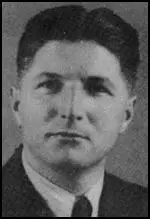Joseph Berchtold

Joseph Berchtold was born in Ingolstadt, Germany, on 6th March, 1897. He served in the German Army during the First World War and reached the rank of second lieutenant. After the war he worked as a stationary salesman.
In 1920 he joined the National Socialist German Workers Party (NSDAP). Four years later Berchtold was appointed as District Director of the Nazi Party in Carinthia and the leader of the local Sturmabteilung (SA). Berchtold made steady progress in the party and in November 1926, replaced Julius Schreck as Reichführer of the Schutzstaffel (SS).
In September 1927 Berchtold issued SS Order No. 1. This instructed SS men not to become involved in discussion at party meetings, and that discussion evenings were for the purpose of political instruction only, during which SS men should not smoke, nor leave the room until the lecture was over. SS men were also told that they must at all times carry their NSDAP membership card, his SS card and the SS songbook. Since the SS was anxious to promote an impression of legality and order, members were forbidden to carry arms.
Berchtold resigned in 1927 and was replaced by his deputy Erhard Heiden. After this he concentrated on journalism and propaganda. In 1928 he founded the journal The Storm Trooper and worked for other fascist publications such as the Völkischer Beobachter. He was also a member of the Supreme SA leadership (OSAF). In March 1936 he became a member of the Reichstag. During the Second World War he served as a captain of the reserve. In 1945 he was arrested by Allied forces but was released and not tried as a war criminal.
Joseph Berchtold died in Herrsching on 23rd August, 1962.
Primary and Secondary Sources
(1) Andrew Mollo, To The Death's Head: The Story of the SS (1982)
Although mostly unemployed, SS men were expected to provide their own uniforms which also differed from those of the SA. SS men wore the brown shirt but, unlike the SA, they had a black cap adorned with a silver death's head, a black tie and black breeches, and the swastika armband was withdrawn from SS men who had infringed minor regulations.
